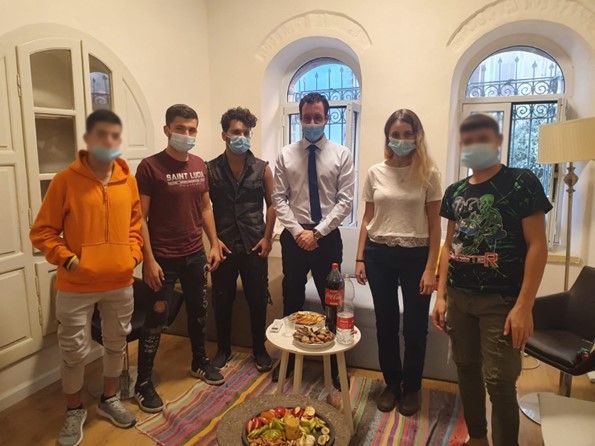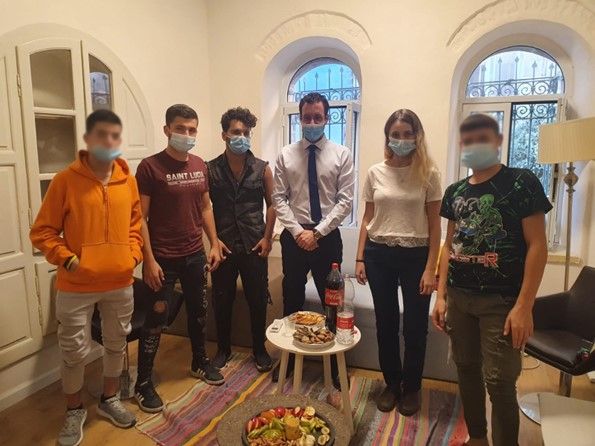The Case for Contributing to Hut HaMeshulash’s
COVID-19 Humanitarian Relief and Recovery Fund
A Proposal for the PPO Foundation
(January 2021)
Organizational background
Founded in 1999, Hut HaMeshulash, an Israeli non-profit organization, established in Jerusalem but
serving national needs, provides practical, emotional, spiritual and vocational assistance to ~900 high-risk teens and young adults (ages 14-25) annually. Included are high-school dropouts; the homeless; those addicted to drugs and alcohol; young people who have turned to crime and prostitution to support themselves; victims of physical/sexual abuse; and others. Of those in our care, approximately: 60% are minors; 40% are young adults; 70% have dropped out of school or attend irregularly; 80% are living at, below or significantly below the poverty line.
Hut HaMeshulash closely collaborates with Israel’s Ministry of Welfare and National Insurance Institute as well as the Jerusalem Municipality to carry out our main projects, which include a multi-use drop-in center; professional skill-building initiatives; and both long-term and transitional residential homes for young men and women. Programming is notable for focusing on the psycho-social needs of those over 18 who have aged-out of other initiatives and the increasing number of young people leaving Ultra-Orthodox communities and find themselves overwhelmed and ill-equipped to deal with general society. Over the last two decades we have provided crisis-intervention and lifeline assistance for more than 11,000 individuals.
Navigating the early days of the pandemic
Hut HaMeshulash is highly experienced in administering to young people in distress with the professional capacities to intervene in crises such as threat of suicide; drug overdose; occurrence of sudden mental health breakdown; voluntary or involuntary hospital admittance; and more. This aside, COVID-19 caught everyone unprepared. Reality has changed as we adjust to new concepts and behaviors -- quarantines, personal-distancing, temperature-taking, mask-wearing, etc. -- all of which further isolate us from one another. This presents an enormous challenge to society’s most vulnerable, namely high-risk young people. Indeed, it did not take long for the crisis to reveal underlying challenges faced by this population, many opting to flee their homes as they found sheltering-in-place more dangerous than street life. Indeed, the situation triggered an immediate and significant increase in demand for services from young people suffering depression, anxiety, and loneliness; sexual abuse and self-harm; and hunger.
While other in-person outreach programs were forced to shutter during the first wave of the pandemic, Hut HaMeshulash was the only organization in Jerusalem authorized to provide in-person drop-in assistance for youth and young adults in various risk situations. We lobbied very hard for this opportunity, exposing the extreme danger to those in our care if we were forced to cease operations. Owing to excellent long-term relations with the welfare authorities and their now deeper appreciation of the issues at stake, we received the coveted ‘essential service-provider status’ which allowed us to offer emergency lifeline support for the length of the shutdown. We have retained this status through the second and now the third shutdown.
Impact of the pandemic on Open Space Drop-in Center
Our flagship initiative, the Open Space Drop-in Center, provides critical outreach to young people (ages 14-25). Operating daily from 10 a.m. until 10 p.m., this energetic multi-purpose center -- a physical and emotional anchor located in Jerusalem’s city center -- offers counseling and therapeutic care; daily hot meals; laundry facilities; showers; Jewish learning and artistic enrichment activities (including creative writing, art and music); legal, social and vocational referrals; refuge from violent domestic circumstances; and a clean and sober respite from street life. On average, some 60 young people utilize the Open Space on a daily basis. Each year we provide more than 5,000 hours of social work care and nearly 44,000 meals.
With over two decades of experience, we are truly alarmed by the current situation and projections for the future. As noted, the pandemic has placed many already vulnerable youth in even greater jeopardy, simultaneously leaving more young people than ever without a daily framework who instead now engage in unhealthy behavior. We note the following shift in demand for services since the outset of the pandemic: males: under 18 (40% increase), over 18 (30% increase); and females: under 18 (25% increase), over 18 (37.5% increase).
Seemly, the continuing pandemic is worsening conditions for these young people as the third wave is accelerating their downward spiral. To counteract this, we continue to provide 12 hours of daily
outreach, modifying activities in accordance with ever-changing social gathering guidelines. This is
important as we are contending with an influx of ultra-Orthodox youth leaving their communities in ever larger numbers, many of whom are suffering deep existential crisis in the face of the pandemic.
Financial forecast
Israel’s government has set an ambitious goal to vaccinate all citizens by spring 2021. Coupled with the current shutdown, this undertaking should ensure many lives are saved and a return to full social and economic functioning, the latter depending on global conditions. This means that sustaining our humanitarian work, now and into the future, and accounting for lost funding and increased expenses, has necessitated the need to establish a “COVID-19 Humanitarian Relief and Recovery Fund.” This will enable us to 1) cover the profound increase in food costs (in excess of $50,000 annually) as our partners such as the King David Hotel and others have been forced to shutter their own operations and halt all in-kind assistance which had allowed our meal program to operate; 2) provide additional social work hours; 3) carry out our enrichment and vocational programming, and more. Hut HaMeshulash’s projected 2021 operating budget totals €1,940,000, some 60% of which is to be provided through our government partners. All other funding must come from local and overseas philanthropic partners.
Request
Society is obligated to "share [our] bread with the hungry and bring the homeless into [our] house." Isaiah 58:7
Hut HaMeshulash is approaching our generous and steadfast partners at the PPO Foundation for a grant of €10,000 in 2021 to help feed the more than 60 young people who come to us daily for at least one hot meal. With the pandemic exposing systemic problems in developing a national response to hunger, the burden to address food insecurity has fallen to the non-profit sector. Those in our care trust us and do not feel shame – as is frequently associated with hunger – in turning to us. We must be there for them and hope the PPO Foundation will join us in this undertaking.
The PPO Foundation accepted the request.
We hope to be able to help Hut HaMeshulash in these difficult times.



